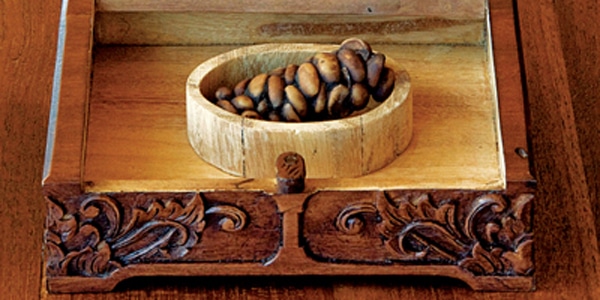Kopi Luwak: The Most "Interesting" Coffee In Indonesia
The Bucket List. That's why I'm here, hacking through this Indonesian overgrowth with a stranger. In said movie, Jack Nicholson and Morgan Freeman were just crossing off a "to do" list before they died. They're the ones who popularized the world's rarest coffee. They're the ones who thought drinking cat poop was so funny. Kopi luwak, it's called. That's what led me to these misty mountains of northern Bali in search of a cup. And it just might kill me.
My new friend swings a machete with indigenous ease. Good, because the trail is nearly impassable. Bad, because he might take my head off. He's leading me to the luwak, or so he says.
This quest began two years ago with a mysterious creature rustling in my attic. One local described it as a "tree-cat that eats chickens." Surely, something was lost in translation. He corrected my pronunciation several times, making the "w" into a "b" and clucking the "k": luwak.
By chance, I mentioned the critter to my brother, a coffee roaster in Georgia. "Start collecting its poop," he said. "You'll get rich." Collecting what? "Kopi luwak," he said. "Haven't you seen The Bucket List?"
After that, I began noticing the infamous beverage all around the island, and wondered if it were something they were using to dupe tourists into $20 pots of coffee. Comes with a T-shirt: I Drank Poop.
Indonesia's funny about coffee. On the island of Java, they mostly drink Nescafé. The local kopi Bali (kopi is Indonesian for "coffee") is frequently blended with powdered corn to add volume. Thus, here in the world's fourth largest coffee-producing country, I make airport runs for reimported Starbucks — while the rare kopi luwak is sold on Amazon.com. Not sure if I'm buying it.
"If you want to taste real kopi luwak," an ex-pat told me, "go to the mountains. Go to Munduk."
By the time I checked into the plush eco-resort at Munduk Moding Plantation, I was into stalker obsession. That afternoon, I hiked the plantation grounds, marveling at the rampant, unchecked manner in which coffee is grown up here. Unknowingly, I wandered off the plantation, stumbling upon a small, rustic farm. The yard stood ankle deep in drying beans. Chickens pecked among the piles. The farmer appeared and asked if I'd like to see a luwak.
So here I am, tromping along the "trail," dodging lazy backswings from his casual machete and second-guessing this impulsive quest. How many other tourists had wandered off the reservation and fallen into this farmer's trap? I'm dropping pocket lint as bread crumbs when we arrive at a busted wooden shed with chickens on the roof. My guide opens a hutch and points inside. There they are: tree cats, like timid black minks. He reaches in, removes a Halloween-size Baby Ruth and asks if I'd like a cup of coffee.
Inside the dirt-floored shed, his roasting station is a blackened pan and a wood fire. He hands me a cracked plastic cup filled with lukewarm mud, possibly prepared with "don't drink the water" water. Mmm, thank you, I nod.
I inhale the aroma and then venture a sip. Wow, it is Mmm. Fresh. Lively. Delicious. I'm a culinary Indiana Jones, sipping the world's most expensive coffee. For free.
"Exquisite," I say. "At long last, kopi luwak."
The farmer raises an eyebrow. No, he says, just normal coffee. He reaches into the rafters and produces a woven tray full of kopi luwak and cockroaches. He offers to sell me some for $50.
Back at the resort, I order a pot of kopi luwak from the menu. Five dollars. Indiana Jones at the museum gift shop. The plantation manager sits down at my table.
"Is this all just a scam?" I ask. "I mean, how long has kopi luwak really been around, anyway?"
"My grandfather was a great coffee drinker," the manager begins. "Whenever he cleaned his coffee fields, he kept the luwak droppings in a special bag. This coffee was only for himself. The very best."
"But now everyone's selling it," I say.
"Yes, but we sell only what we find in our fields," he explains. "The luwak is a migratory creature. It makes no home. It must eat other things besides coffee beans. Bananas. Papaya. Sometimes even chickens. These flavors, along with enzymes in their belly, give kopi luwak its unique quality."
A tray arrives. White china. Gleaming silver. Sugar and cream, in which I won't indulge. "Please," he says, removing himself. "Enjoy."
The view is sublime. Panoramic jungles sprawl to a misty sea. Emerald canopies conceal untold mysteries. Here on the mountaintop, I am alone with kopi luwak. And I am afraid.
The first sip is sublime. Smooth and adventurous. Fruity and bold. Just a hint of chicken. OK, sure, I've probably had better cups of coffee, but never one so satisfying. I cross it off the list.
